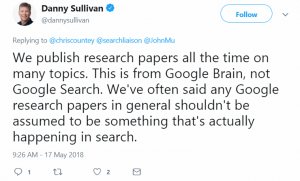Google recently unveiled research to design a new algorithm. Google’s Paraphrasing algorithm can examine the content of multiple web pages and produce a recent, dedicated article based on them. So far, we have introduced several Google algorithms, such as Google Dance and Rank Brain, in other Smart Strategy blog articles. In the article “An Ultimate Guide to SEO (Search Engine Optimization)” we introduce the Paraphrasing algorithm. Join us to learn more about this concept.
How does the Paraphrasing Algorithm work?
The paraphrasing algorithm examines the content of each page and removes sections that do not contain important information. Doing so practically produces a useful and helpful summary of the page content. Perhaps the closest example of a paraphrasing algorithm is the results displayed in the featured Snippets on the SERP.

Of course, this algorithm goes a step further and produces content based on a combination of several web pages. In the next step, using another algorithm based on artificial intelligence, the authenticity of the content is checked, and incorrect information is removed from it.
In the following steps, the answer to the user’s question may be collected from the total content of two completely separate pages on the Internet and provided to him. By doing this, the user will practically not need to visit the site and read its full text.
Google will no longer need your content!
In this research, it has been announced that Google can produce and provide the user with the desired content based on the information collected from the web. As a result, there will be no need for your site and user referrals.
This has created a new concern among web admins and content producers. With the implementation of this algorithm in search results, we will surely see a significant decrease in the number of site visitors, which can disrupt the online site marketing process.
Paraphrasing algorithm research is not related to Google search.
With increasing concerns and questions from Twitter users, Danny Sullivan, Google’s search engine, has announced that the research was conducted and published by Google Brain. As a result, it does not mean using them in Google Search. Google is always doing more research and presenting results, but not all of them are necessarily used in search engine algorithms.

This response shows that, at least this year, Google does not intend to use this new research in ranking Google results or displaying answers to users. Still, Google’s policies may change in the future and become a more responsive search engine.
conclusion
This post on smart strategy shows that, If Google can generate such complex algorithms, it can quickly analyze the quality of a page’s content and identify valuable parts of it.
Content generation no longer means text targeted to specific words. Instead, we need to pay more attention to the critical concept and responsiveness to users in the content.
Please contact us through the smart strategy SEO service page if you have any questions. Also, visit our linkedin profile to see our content summaries.
